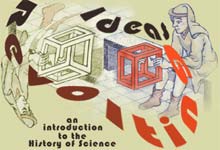
University of California, Irvine
Instructor: Dr. Barbara J. Becker

|
|
|
Life and science on the boundary between the Natural and the Artificial |
|
| Early concepts of man-made man:
Let the semen of a man putrify by itself in a container with the highest putrefaction of horse dung for forty days, or until it begins at last to live, move, and be agitated, which can easily be seen. After this time it will be in some degree like a human being, but nevertheless, transparent and without body. If now, after this, it be every day nourished and fed cautiously and prudently with elixir of human blood, and kept for forty days in the perpetual and equal heat of horse dung, it becomes thenceforth a true and living infant, having all the members of a child that is born from a woman, but much smaller. This we call a humunculus; and it should afterwards be educated with the greatest care and zeal, until it grows and begins to display intelligence. Now this is one of the greatest secrets which God has revealed to moral and fallible man. |
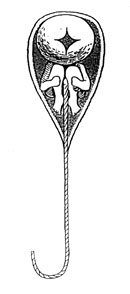
|
Rabbi Judah Loew (1513-1609) of Prague and the Golem |
|
|
[Rabbi Judah Loew (1513-1609) of Prague] sent for his son-in-law, Isaac ben Simson, who was a priest, and for his pupil, Jacob ben Chayim Sasson, who was a Levite, and confided to them the mysterious manner in which he hoped to be able to make the Golem. |
|
|
My second Machine, or Automaton, is a Duck, in which I represent the Mechanism of the Intestines which are employed in the Operations of Eating, Drinking, and Digestion: Wherein the Working of all the Parts necessary for those Actions is exactly imitated. The Duck stretches out its Neck to take Corn out of your Hand; it swallows it, digests it, and discharges it digested by the usual Passage. 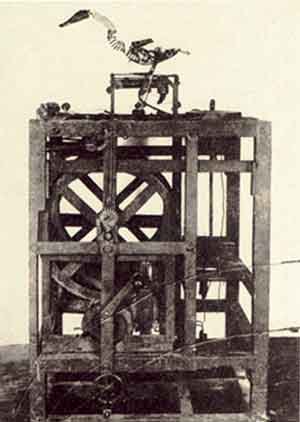
Vaucanson's mechanical duck (1738) |
|
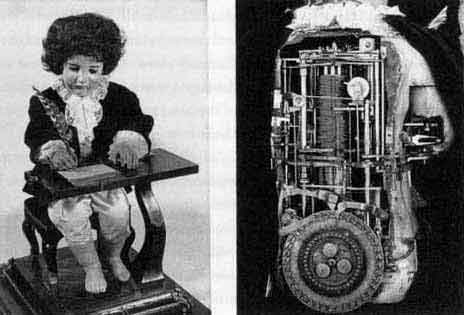
The Writer (ca. 1770), an automaton by Jacquet-Droz, and its internal mechanical workings viewed from the back. |
|
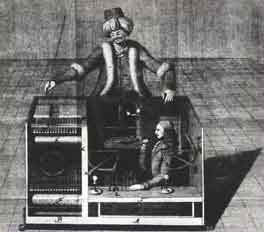
von Kempelen's Chess-playing Turk (ca. 1770) |
|
The American Journal of Science & Arts; Vol. 35: 125-137 (January, 1839) |
|
|
...My object in subjecting this fluid to a long-continued electric action, through the intervention of the porous stone, was to form, if possible, crystals of silica at one of the poles of the battery, but I failed in accomplishing this by those means. On the 14th day from the commencement of the experiment, I observed, through a lens, a few small white excrescences or nipples projecting from about the middle of the electrified stone, and nearly under the dropping of the fluid above. On the 18th day, these projections enlarged, and 7 or 8 filaments, each of them longer than the excrescence from which it grew, made their appearance on each of the nipples.

On the 22nd day, these appearances were more elevated and distinct, and on the 26th day, each figure assumed the form of a perfect insect, standing erect on a few bristles which formed its tail. Till this period I had no notion that these appearances were any other than an incipient mineral formation; but it was not until the 28th day, when I plainly perceived these little creatures move their legs, that I felt any surprise, and I must own that when this took place, I was not a little astonished. 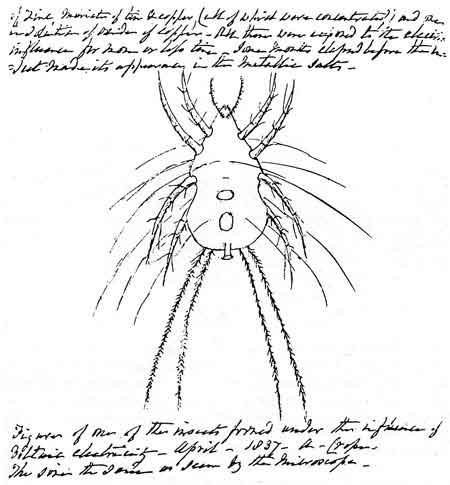
Crosse's acarus (1837) I endeavored to detach, with the point of a needle, one or two of them from its position on the stone, but they immediately died, and I was obliged to wait patiently for a few days longer, when they separated themselves from the stone, and moved about at pleasure, although they had been for some time after their birth apparently averse to motion. In the course of a few weeks, about a hundred of them made their appearance on the stone. I observed that at first each of them fixed itself for a considerable time in one spot, appearing, as far as I could judge, to feed by suction; but when a ray of light from the sun was directed upon it, it seemed disturbed, and removed itself to the shaded part of the stone. Out of about a hundred insects, not above 5 or 6 were born on the south side of the stone. I examined them with the microscope, and observed that the smaller ones appeared to have only 6 legs, but the larger ones 8. It would be superfluous to attempt a description of these little mites, when so excellent a one has been transmitted from Paris. It seems that they are of the genus Acarus, but of a species not hitherto observed. I have had 3 separate formations of similar insects at different times, from fresh portions of the same fluid, with the same apparatus. As I considered the result of my experiment rather extraordinary, I made some of my friends acquainted with it, amongst whom were some highly scientific gentlemen, and they plainly perceived the insect in various states. I likewise transmitted some of them to one of our most distinguished physiologists in London, and the opinion of this gentleman, as well as of other eminent persons to whom he showed them, coincided with that of the gentleman of the Academie des Sciences, as to their genus and species. I have never ventured an opinion as to the cause of their birth, and for a very simple reason--I was unable to form one. The most simple solution of the problem which occurred to me, was that they arose from ova deposited by insects floating in the atmosphere, and that they might possibly be hatched by the electric action. Still, I could not imagine that an ovum could shoot out filaments, and that those filaments would become bristles; and moreover, I could not detect, on the closest examination, any remains of a shell. Again, we have no right to assume that electric action is necessary to vitality, until such fact shall have been most distinctly proved. I next imagined, as others have done, that they might have originated from the water, and consequently made a close examination of several hundred vessels, filled with the same water as that which held in solution the silicate of potassa, in the same room, which vessels constituted the cells of a large Voltaic battery, used without acid. In none of these vessels could I perceive the trace of an insect of that description. I likewise closely examined the crevices and most dusty parts of the room with no better success. In the course of some months, indeed, these insects so increased, that when they were strong enough to leave their moistened birthplace, they issued out in different directions, I suppose in quest of food; but they generally huddled together under a card or piece of paper in their neighborhood, as if to avoid light and disturbance.... |
|
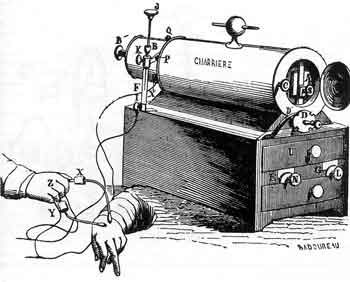
Duchenne's electrical method of stimulating isolated muscle fibers. |
|
Galvanic Experiments: Stories from the Times of London |
|
Frankenstein; or The Modern Prometheus
|
|

Mary Shelley (1797 - 1851)
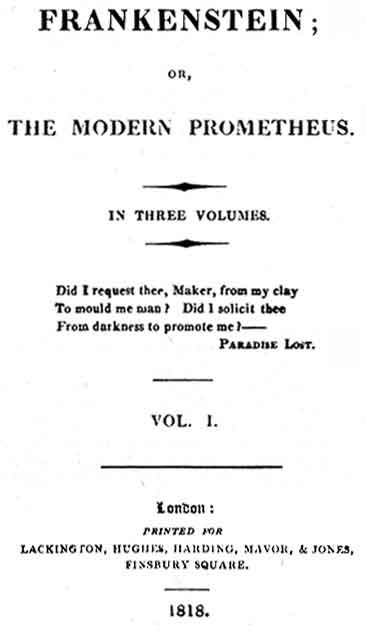
Title page, Frankenstein (1818) |
|
Frankenstein; or, The Modern Prometheus |
Letter 1 I shall satiate my ardent curiosity with the sight of a part of the world never before visited, and may tread a land never before imprinted by the foot of man.... [Y]ou cannot contest the inestimable benefit which I shall confer on all mankind to the last generation.... * * * Letter 2 There is something at work in my soul which I do not understand. I am practically industrious--painstaking, a workman to execute with perseverance and labour--but besides this there is a love for the marvellous, a belief in the marvellous, intertwined in all my projects, which hurries me out of the common pathways of men.... * * * Letter 3 But success shall crown my endeavours. Wherefore not?... What can stop the determined heart and resolved will of man? |
Victor Frankenstein: I chanced to find a volume of the works of Cornelius Agrippa.... A new light seemed to dawn upon my mind, and bounding with joy, I communicated my discovery to my father.... "Ah! Cornelius Agrippa! My dear Victor, do not waste your time upon this; it is sad trash." 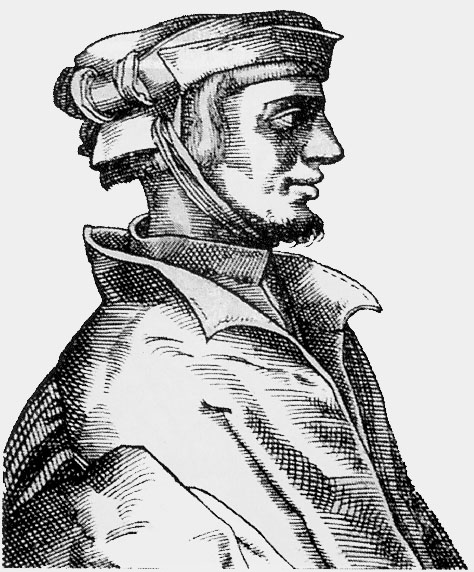
Cornelius Agrippa (1486 - 1535) ...I entered with the greatest diligence into the search of the philosopher's stone and the elixir of life.... Wealth was an inferior object, but what glory would attend the discovery if I could banish disease from the human frame and render man invulnerable to any but a violent death?... When I was about fifteen years old ... we witnessed a most violent and terrible thunderstorm.... Before this I was not unacquainted with the more obvious laws of electricity. On this occasion a man of great research in natural philosophy was with us, and excited by this catastrophe, he entered on the explanation of a theory which he had formed on the subject of electricity and galvanism, which was at once new and astonishing to me.... |
Professor Waldman (on modern chemistry): ...these [modern] philosophers, whose hands seem only made to dabble in dirt, and their eyes to pore over the microscope or crucible, have indeed performed miracles. They penetrate into the recesses of nature and show how she works in
her hiding places. They ascend into the heavens; they have discovered
how the blood circulates, and the nature of the air we breathe. They
have acquired new and almost unlimited powers....
Victor Frankenstein: ...soon my mind was filled with one thought, one conception, one purpose. So much has been done, exclaimed the soul of Frankenstein--more, far more, will I achieve; treading in the steps already marked, I will pioneer a new way, explore unknown powers, and unfold to the world the deepest mysteries of creation. |
Victor Frankenstein: Whence, I often asked myself, did the principle of life proceed?... To examine the causes of life, we must first have recourse to death.... I paused, examining and analysing all the minutiae of causation, as exemplifed in the change from life to death, and death to life, until from the midst of this darkness a sudden light broke in upon me--a light so brilliant and wondrous, yet so simple, that while I became dizzy with the immensity of the prospect which it illustrated, I was surprised that among so many men of genius who had directed their inquiries towards the same science, that I alone should be reserved to discover so astonishing a secret.... After days and nights of incredible labour and fatigue, I succeeded in discovering the cause of generation and life; nay, more, I became myself capable of bestowing animation upon lifeless matter. The astonishment which I had at first experienced on this discovery soon gave place to delight and rapture.... Learn from me, if not by my precepts, at least by my example, how dangerous is the acquirement of knowledge and how much happier that man is who believes his native town to be the world, than he who aspires to become greater than his nature will allow.... Life and death appeared to me ideal bounds which I should ... break through. A new species would bless me as its creator and source; many happy and excellent natures would owe their being to me. No father could claim the gratitude of his child so completely as I should deserve theirs.... |
Victor Frankenstein: It was on a dreary night of November that I beheld the accomplishment of my toils. With an anxiety that almost amounted to agony, I collected the instruments of life around me, that I might infuse a spark of being into the lifeless thing that lay at my feet. It was already one in the morning; the rain pattered dismally against
the panes, and my candle was nearly burnt out, when, by the glimmer of
the half-extinguished light, I saw the dull yellow eye of the creature
open; it breathed hard, and a convulsive motion agitated its limbs....
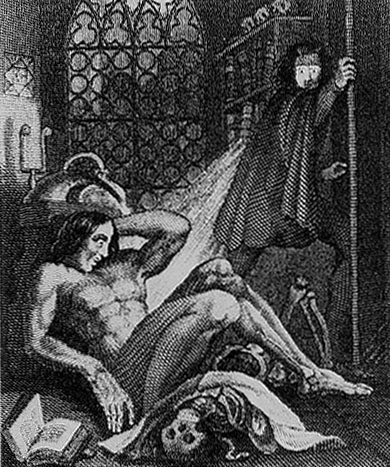
Frontispiece illustration to 1831 edition of Frankenstein |
Chapter 24 Victor Frankenstein: Farewell Walton! Seek happiness in tranquility and avoid ambition, even if it be only the apparently innocent one of distinguishing yourself in science and discoveries. |
Faust: The Tragedy (1832) by Johann Wolfgang von Goethe (1749-1832) |
(Leader of the team that produced Dolly the sheep, the first adult mammal clone speaking at UCI, 26 February 2002) |
"I hope that we will not be frightened by the potential misuse of this technology [cloning] and can have a period of very ambitious research before we move into a period of cautious application." |
|